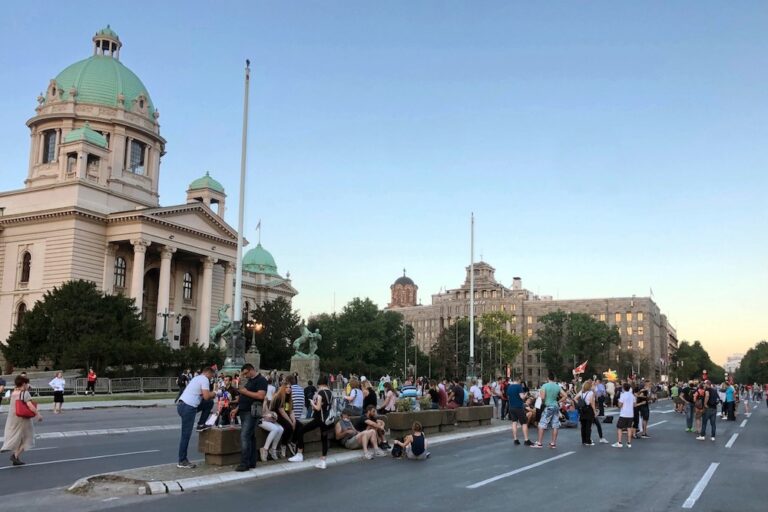(CPJ/IFEX) – On 8 April 1999, British Air Commodore David Wilby said that since the Serbian state-run radio and television were “an instrument of propaganda and repression,” it “is therefore a legitimate target.” The following day, CPJ sent a letter to NATO general secretary Javier Solana asking for clarification of the criteria NATO planned to […]
(CPJ/IFEX) – On 8 April 1999, British Air Commodore David Wilby said that
since the Serbian state-run radio and television were “an instrument of
propaganda and repression,” it “is therefore a legitimate target.” The
following day, CPJ sent a letter to NATO general secretary Javier Solana
asking for clarification of the criteria NATO planned to use to distinguish
between “journalists”, who were not targets, and “propagandists”, who
presumably are. CPJ has not received a response. That same day, NATO bombed
several television transmission towers. Among those reported to have been
hit are the Pristina tower and Belgrade’s northern tower. Pristina is thus
effectively cut off from official news sources, and there are no independent
news sources left. The tower in the south of Belgrade is still transmitting
while the smaller local television stations with their own transmitters are
rebroadcasting state programming to those who depended on the northern
tower.
**Updates IFEX alerts on NATO’s position of 9 April 1999; and alerts on the
Haxhiu case of 31 March, 30 March and 29 March 1999**
Independent radio and television stations in Montenegro are increasingly
under pressure from the federal government to produce more “patriotic”
programming. According to the Association of Independent Broadcasters (ANEM)
in Montenegro, the Ministry of Information has sent written orders to all of
its members to stop foreign broadcasts such as those from the Voice of
America and Radio Free Europe. All Montenegran ANEM affiliates have refused
to obey the order, with the support of the Montenegro government. The
federal government has also attempted to take over the programming of
TV-Montenegro, the state-owned television station. President Milo Djukanovic
has posted police around the station to prevent a takeover by federal troops
led by Gen. Milorad Obradovic, who commands federal troops in Montenegro.
CPJ is welcoming the news that Kosovo Albanian editor Baton Haxhiu is alive
and well. After NATO and other Western sources reported that Haxhiu, an
editor of “Koha Ditore”, had been murdered, he surfaced in Skopje,
Macedonia, on 6 April. After watching a news program on SKY news in which
NATO declared him dead, Haxhiu spent twelve days hiding in basements in
Kosovo, until he could escape into Macedonia. Chrystyna Lapychak, CPJ’s
program coordinator for Central and Eastern Europe and the republics of the
former Soviet Union, said, “We are delighted that Haxhiu is still with us
and glad to finally have some good news.”
Radio Liberty reported that Gleb Ovsyannikov, a correspondent for Russian
public television, and his video engineer, were expelled from Yugoslavia by
government
authorities. According to the network, after its “Vesti” program showed the
destruction of an Interior Ministry building by a NATO bomb, the journalists
were stripped of their visas and forced to leave the country. And on 4
April, the Russian NTV network complained that their broadcasts from the
region were subjected to military censorship
For background information on the media crackdown in Yugoslavia, visit CPJ’s
website at http://www.cpj.org or call Judith Leynse at (212) 465-1004, x105
or Chrystyna Lapychak at (212) 465-1004 x101.


